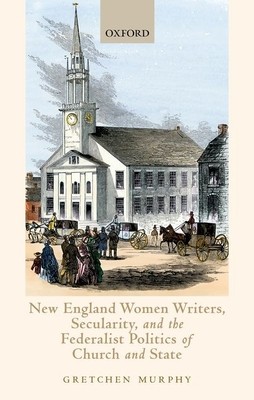
- We will send in 10–14 business days.
- Author: Gretchen Murphy
- Publisher: Oxford University Press, USA
- ISBN-10: 0198864957
- ISBN-13: 9780198864950
- Format: 14.2 x 21.8 x 2.3 cm, hardcover
- Language: English
- SAVE -10% with code: EXTRA
New England Women Writers, Secularity, and the Federalist Politics of Church and State (e-book) (used book) | bookbook.eu
Reviews
Description
Drawing on literature, correspondence, sermons, legal writing, and newspaper publishing, this book offers a new account women's political participation and the process of religious disestablishment. Scholars have long known that eighteenth- and nineteenth-century American women wrote pious, sentimental stories, but this book uses biographical and archival methods to understand their religious concerns as entry points into the era's debates about democratic conditions of possibility and the role of religion in a republic. Beginning with the early republic's constitutional and electoral contests about the end of religious establishment and extending through the nineteenth century, Murphy argues that Federalist women and Federalist daughters of the next generation adapted that party's ideas and fears by promoting privatized Christianity with public purpose. Harriet Beecher Stowe, Catharine Sedgwick, Lydia Sigourney, Judith Sargent Murray, and Sally Sayward Wood authorised themselves
as Federalism's literary curators, and in doing so they imagined new configurations of religion and revolution, faith and rationality, public and private. They did so using literary form, writing in gothic, sentimental, and regionalist genres to update the Federalist concatenation of religion, morality, and government in response to changing conditions of secularity and religious privatization in the new republic. Murphy shows that their project both complicates received narratives of separation of church and state and illuminates the problem of democracy and belief in postsecular America.
EXTRA 10 % discount with code: EXTRA
The promotion ends in 19d.09:08:00
The discount code is valid when purchasing from 10 €. Discounts do not stack.
- Author: Gretchen Murphy
- Publisher: Oxford University Press, USA
- ISBN-10: 0198864957
- ISBN-13: 9780198864950
- Format: 14.2 x 21.8 x 2.3 cm, hardcover
- Language: English English
Drawing on literature, correspondence, sermons, legal writing, and newspaper publishing, this book offers a new account women's political participation and the process of religious disestablishment. Scholars have long known that eighteenth- and nineteenth-century American women wrote pious, sentimental stories, but this book uses biographical and archival methods to understand their religious concerns as entry points into the era's debates about democratic conditions of possibility and the role of religion in a republic. Beginning with the early republic's constitutional and electoral contests about the end of religious establishment and extending through the nineteenth century, Murphy argues that Federalist women and Federalist daughters of the next generation adapted that party's ideas and fears by promoting privatized Christianity with public purpose. Harriet Beecher Stowe, Catharine Sedgwick, Lydia Sigourney, Judith Sargent Murray, and Sally Sayward Wood authorised themselves
as Federalism's literary curators, and in doing so they imagined new configurations of religion and revolution, faith and rationality, public and private. They did so using literary form, writing in gothic, sentimental, and regionalist genres to update the Federalist concatenation of religion, morality, and government in response to changing conditions of secularity and religious privatization in the new republic. Murphy shows that their project both complicates received narratives of separation of church and state and illuminates the problem of democracy and belief in postsecular America.


Reviews